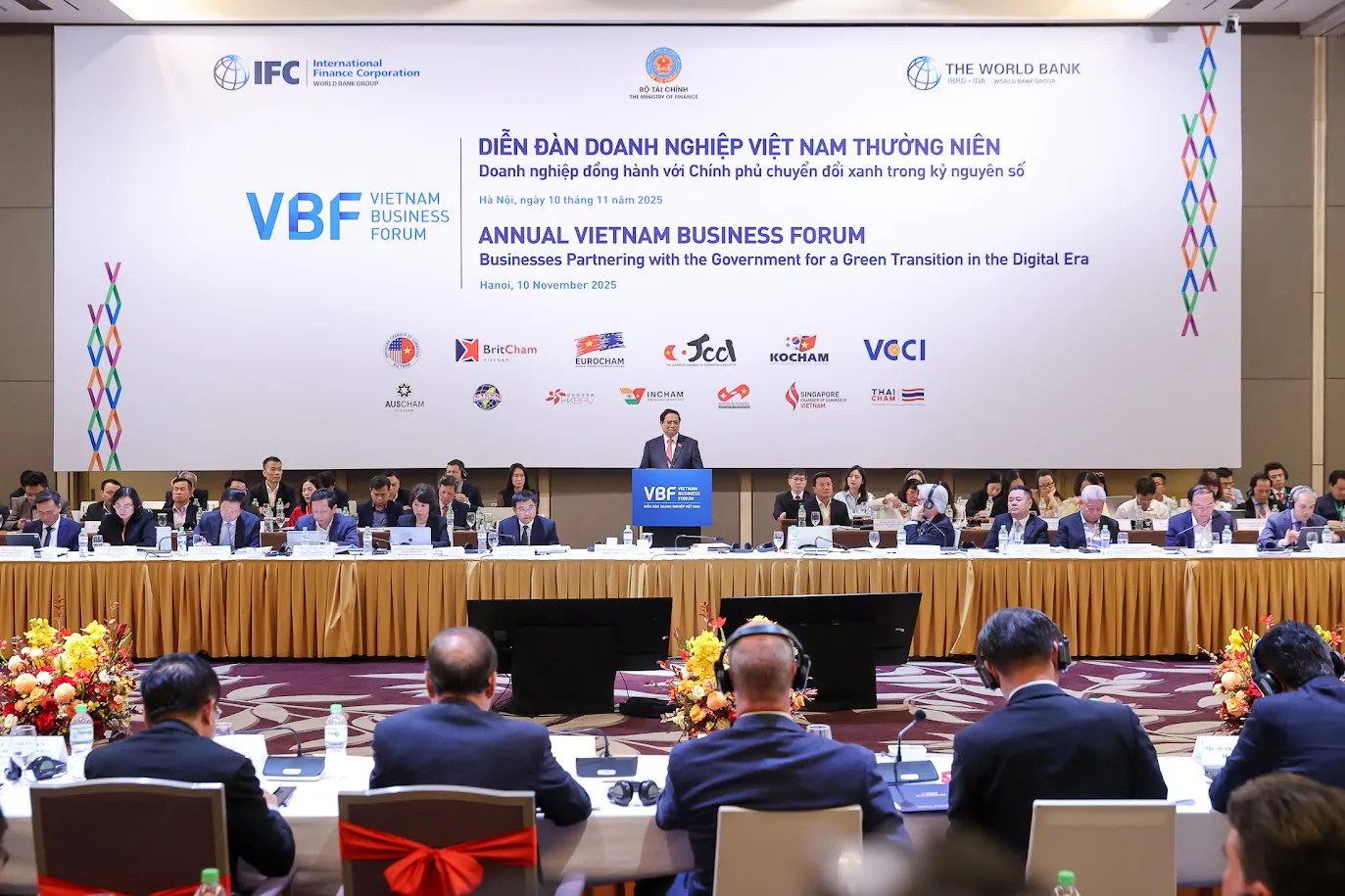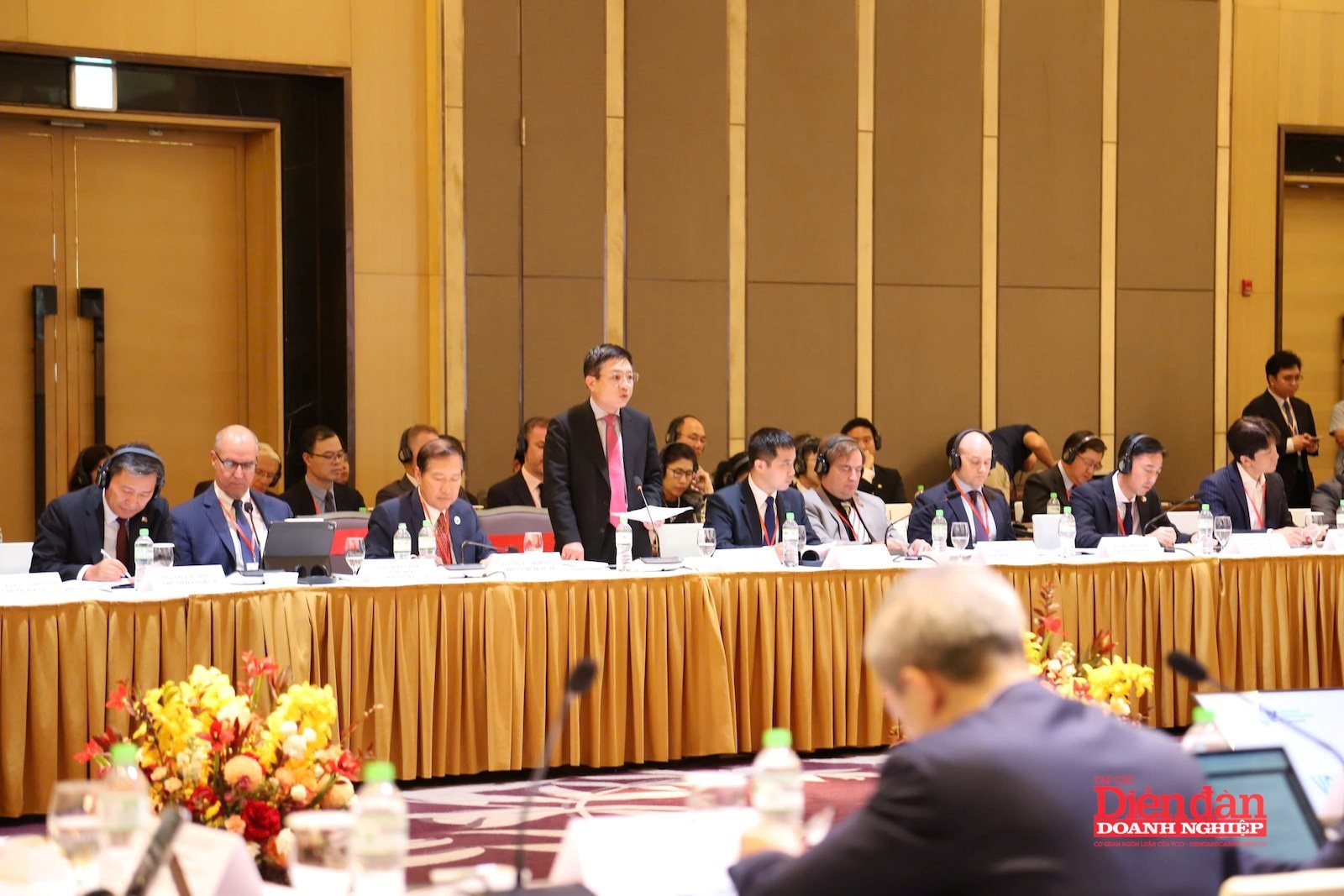Businesses commit to long-term partnership with government for green transformation
At the 2025 Vietnam Business Forum, both domestic and foreign enterprises expressed their determination to work alongside the government in advancing green transformation and digital development to achieve national growth targets.
The business community in Vietnam expressed its long-term commitment to accompany the government in green transformation and digital development to achieve socio-economic goals at the 2025 Vietnam Business Forum held on November 10.

The 2025 Vietnam Business Forum takes place on November 10 in Hanoi. Photo: VGP
According to Assoc. Prof. Dr. Ho Sy Hung, President of the Vietnam Chamber of Commerce and Industry (VCCI), this year’s forum, themed “Businesses Partnering with the Government for a Green Transition in the Digital Era”, carries a strategic message.
He affirmed that Vietnamese and foreign businesses will remain reliable long-term partners to the government, contributing resources, technology and expertise to address major national challenges and achieve development targets such as the 8% growth goal.
The VCCI President said the business community highly appreciates the government’s strategic vision and decisive leadership, especially that of Prime Minister Pham Minh Chinh, in promoting two key pillars of growth: the Net Zero 2050 commitment and the National Digital Economy Strategy.
The Co-Chair of the Vietnam Business Forum (VBF) Consortium outlined institutional improvement and stronger policy enforcement, energy transition mechanisms to implement Power Development Plan VIII, “soft” infrastructure for the digital era and financial flows for private sector development as four breakthrough proposals for green and digital transformation.
“Businesses need a stable, transparent, predictable and consistent legal framework across different periods and localities, especially to resolve issues related to taxes, VAT refunds, customs and land,” said Hung.
To achieve green transformation, he called for breakthroughs in energy mechanisms and the removal of barriers to financial feasibility, particularly green finance, for large-scale projects such as LNG, offshore wind and the carbon credit market.
Assoc. Prof. Dr. Ho Sy Hung also said the digital era requires a complete legal framework on data management and cybersecurity, simpler licensing for e-commerce and high-quality human resources with digital skills.
Regarding financial resources, he suggested upgrading Vietnam’s stock market classification, enabling foreign-invested enterprises (FDI) to list shares on the local exchange and diversifying financial products for businesses.
“The business community at the VBF deeply understands its role. The cooperation between FDI and Vietnamese enterprises is inseparable,” said Hung.

He noted that FDI firms and international business associations bring capital, advanced technology and global standards, while Vietnamese companies leverage domestic strength to absorb technology, connect supply chains and promote sustainable growth.
“The prime minister’s presence and direct instructions today show that all business recommendations will be heard and effectively addressed,” he emphasized.
Prime Minister Pham Minh Chinh affirmed that green and digital transformation are key drivers for Vietnam’s rapid and sustainable development, helping boost growth, unlock new economic drivers and build an independent, self-reliant and globally integrated economy.
He highlighted several achievements in socio-economic development and efforts in institutional reform, improving the business environment and facilitating enterprise operations.
These include decisive implementation of government restructuring toward streamlined two-tier local administration, stronger decentralization and more effective governance. The government is shifting from administrative management to public service and development facilitation.
The prime minister emphasized major political and institutional breakthroughs, including resolutions from the Politburo on science and technology, private sector development, international economic integration and lawmaking reform.
He said new resolutions are being prepared to promote state-owned and foreign-invested economic sectors, forming a strong foundation for national growth.
On green growth, he said Vietnam has made specific commitments at COP26 to achieve net zero emissions by 2050. Meanwhile, digital transformation contributes to a more transparent business environment and greater convenience for enterprises.
“Vietnam hopes to continue receiving support and cooperation from developed countries, international partners and FDI enterprises in terms of capital, institutions, technology, governance and human resource training,” the prime minister said.
He reaffirmed Vietnam’s commitment to maintaining political stability, social order and macroeconomic stability, advancing three strategic breakthroughs in institutions, human resources and infrastructure, restructuring the economy toward industry, services and urbanization and fostering innovation and science-based growth.Vietnam will also strengthen regional and global connectivity, link domestic enterprises with FDI and global partners and build stronger production, supply and value chains.
Prime Minister Chinh pledged to continue administrative reform, improve the business environment, promote digital transformation and develop tools and standards to measure and monitor green growth and high-quality human resource development.
He urged FDI enterprises to expand investment, transfer technology, connect with local businesses and help build modern, smart governance systems.
“Vietnam remains open and cooperative, willing to engage in honest dialogue and joint problem-solving to foster fast and sustainable growth,” he said, emphasizing the spirit of “listening, understanding, sharing, winning and developing together” with businesses and investors.
Concrete proposals from enterprises and organizations
According to VCCI Deputy Secretary-General Dau Anh Tuan, two major shifts are now shaping Vietnam’s economy: renewed thinking in FDI attraction and policy breakthroughs for green transformation.

An FDI company operates at Quang Minh Industrial Park in Hanoi's Me Linh Commune. Photo: Pham Hung/The Hanoi Times
He said the investment climate in Vietnam is recovering strongly and international investors are showing greater confidence in the country’s long-term prospects. However, new-generation FDI seeks transparency, local supply chain connectivity and sustainable development instead of merely low costs.
The shift from mass production to high-value manufacturing and from export-oriented to domestic market-focused operations requires Vietnam to upgrade its institutions, workforce and business support policies, Tuan said.
He noted that the Provincial Green Index (PGI) published by VCCI in May 2025 shows significant local progress in improving the green business environment. Still, administrative burdens, informal costs and lack of policy consistency remain major barriers.
Based on this reality, he proposed institutional reforms and better policy execution, prioritizing administrative simplification in investment, land, environment and construction.
He said digitalizing all administrative procedures, publicizing progress and implementing a one-stop-shop mechanism will reduce compliance costs and improve transparency and efficiency.
Tuan also called for risk-based inspection and audit systems to avoid overlap and unnecessary intervention. Transparent processes, clear criteria and published results will strengthen trust and fairness in law enforcement.
The VCCI representative recommended promoting green investment and enterprise development, establishing carbon credit and green bond markets and introducing credit guarantees for small and medium-sized enterprises (SMEs).
Banks should be encouraged to create green financial products with preferential interest rates, while a national set of criteria for green investment projects should be issued to guide tax, land and loan incentives.
SMEs should receive technical assistance, green transition consulting, ESG training and environmental certification support. A “green business incubator” model could be piloted in key provinces to create an innovation ecosystem.
Tuan also urged empowering local governments. Green transition must start at the grassroots level. Integrating the PGI into governance assessments will create clear and transparent reform incentives.
“The state budget should include mechanisms to reward local authorities with strong green performance, allowing them to reinvest in green initiatives,” he said.
“Each province should set up a green transition task force involving businesses, associations, experts and local authorities to promote effective public–private cooperation.”
Thomas Jacobs, Acting Regional Director for East Asia and the Pacific at the International Finance Corporation (IFC), said that Vietnam’s growth achievements and goals give foreign investors a great opportunity to expand their local operations.

A PVcomBank office in Hanoi. Photo: Pham Hung/The Hanoi Times
He added that sustainable growth requires greater investment in people, the environment, infrastructure and sound policies. In this new era, Vietnam must continue to transform and strengthen cooperation between the public and private sectors.
Jacobs said Vietnam faces many opportunities, but to seize them, attracting private investment is essential. This requires transparent and stable policies and a more favorable business environment.
He also stressed the importance of connecting with strategic partners to gain access to technology, resources and management experience in key sectors such as trade, technology, tourism and investment.
According to Mariam Sherman, Country Director of the World Bank for Vietnam, Cambodia and Laos, the FTSE’s recent upgrading Vietnam to “emerging market” status will enable long-term foreign capital to flow into sustainable and efficient projects in Vietnam.
The World Bank representative praised Vietnam’s reforms and said investor confidence is growing, leaving vast potential for further development.
According to Sherman, recent reforms under Resolutions 68 and 66 on administrative simplification and private sector development will help businesses grow, innovate, improve productivity and participate more deeply in global value chains.
“When FDI enterprises strengthen linkages with local suppliers, knowledge and quality standards spread faster, helping Vietnam move from assembly to design and manufacturing,” she said.
Sherman urged Vietnam to reform its training system, promote STEM education, develop vocational programs and expand public–private training partnerships.
She also recommended greater investment in transport, energy and climate resilience as energy demand is projected to rise by around 9% by 2025, requiring nearly double the current capacity and modernization of the power grid, along with clear, stable and transparent policy frameworks.








